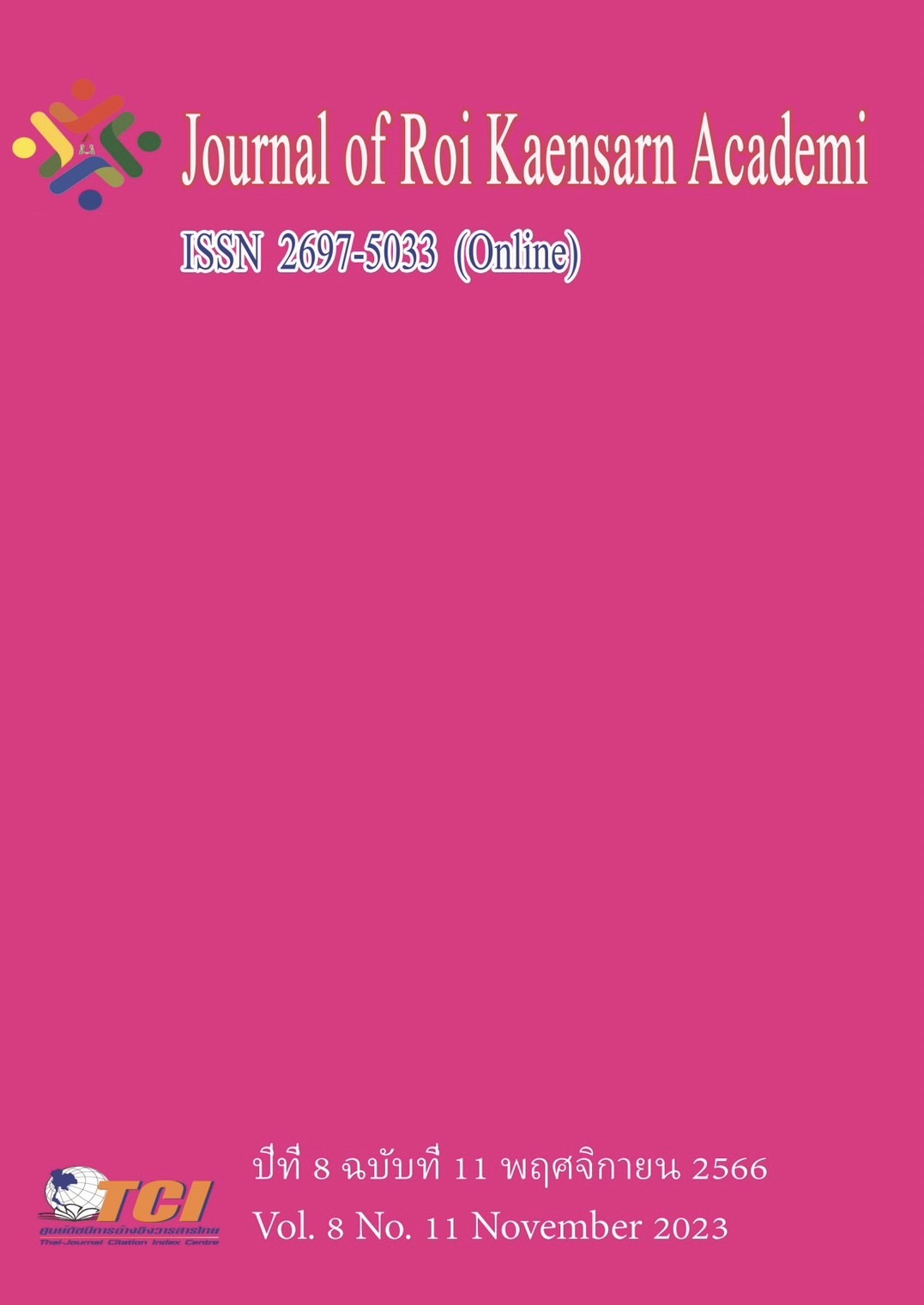A Cross-level Interaction Effects of Organizational Climate on the Relationship between Personal Factors and Art Teachers' Professional Leadership in Higher Educational Institutions in Hunan Province: A Multilevel Analysis
Main Article Content
บทคัดย่อ
The objectives of this research were: (1) To study the organizational contextual effects that affect Art teachers’ professional leadership, (2) to study the effects of personal factors on Art teachers’ professional leadership when the influence of organizational climate remains unchanged, (3) to study the effects of organizational climate on Art teachers’ professional leadership in the organizational level when controlling the organizational contextual effects constant, and (4) to study the cross-level interaction effect of organizational climate on the relationship between personal factors and Art teachers’ professional leadership.
The research method was a quantitative survey research, Multilevel Structural Equation Model (MSEM), including individual and organizational levels. Population were divided into 2 sub-populations that were hierarchically nested namely (1) Art teachers and (2) administrators of Fine Art faculty who were working in public colleges and universities in Hunan Province, people's republic of China in the academic year 2023. The sample of the Art teacher group and administrator group were selected by the multi-stage proportional random sampling method, the total sample were 300 art teachers at the individual level and 100 administrators at the organizational level.
The research findings revealed that (1) The art teachers’ professional leadership was affected by the organizational contextual effects; (2) When the influence of organizational climate remains unchanged, the teaching-age and characteristics in the personal factors had a direct impact on art teachers’ professional leadership while gender, self-efficacy and personal leadership skill did not significantly affect art teacher leadership; (3) without considering the organizational climate of a certain university, the organizational climate had an effect on art teachers’ professional leadership; (4) organizational climate had cross-level interaction with individual characteristics and personal leader skill effects on art teachers' professional leadership, but the cross-interaction with gender, Teaching-Age, and self-efficacy found not significantly effect on Art teachers’ leadership.
Article Details
เอกสารอ้างอิง
Dewey, J. (2005). How we think. Experience and Education. Beijing: People's Education Press.
Duan, J., Wang, J., & Zhu, Y. (2014). Organizational climate: A review of conceptualization, theory and prospects. Advances in Psychological Science. 22 (12), 1964-1974. https://doi.org/10.3724/SP.J.1042.2014.01964
Duan, Y. (2008). Practical Research on Teachers' Professional Development. Fuzhou: Lujiang Publishing House.
Fang, J., Qiu, H., & Zhang, M. (2011). Analysis of Situation Effects Based on Multilevel Structural Equation Model-Comparison with Multilevel Linear Model. Advances in Psychological Science. 19 (2), 284-292.
Frazier, M.L. (2009). Voice climate in organizations: A group level examination of antecedents and performance outcomes [Doctoral dissertation, Oklahoma State University].
Frost, D., & Harris, A. (2003). Teacher leadership: Towards a research agenda. Cambridge Journal of Education. 33 (3), 479-498. https://doi.org/10.1080/03057640320001220 78
Hallinger, P. (1992). The evolving role of American principals: From managerial to instructional to transformational leaders. Journal of Educational Administration. 30 (3), 2-8. https://doi.org/10.1108/09578239210014306
Jiao, X. (2023). An Empirical Study on the Professional Ability Development of Higher Vocational Teachers from the Perspective of High-Quality Development—Based on a Survey of 422 Teachers of Higher Vocational Colleges in Jiangsu. Jiangsu Higher Education. 1 (1), 111-117. https://doi.org/10.13236/j.cnki.jshe.2023.01.016
Little, T.D., Bovaird, J.A., & Card, N.A. (2007). Modeling contextual effects in longitudinal studies. Mahwah, N.J: Lawrence Erlbaum Associates.
Ma, L., & Gu, Y. (2022). Current status and development strategies of teacher leadership in new high-quality schools——Based on an empirical survey of 292 new high-quality schools in Chengdu. Teacher Education Forum. 35 (06), 28-31.
Pan, X. (2014). Research on School Organizational Climate. Chongqing: Southwest Normal University Press.
Qiu, H., & Wen, F. (2007). Hierarchical linear model analysis of context effect: Taking school organizational innovation atmosphere and teachers' creative performance as examples. Education and Psychology Research (Taiwan). 30 (1), 1-35.
Shangguan, D. (2014). Research on Influencing Factors of Effective Realization of Teachers' Leadership in Colleges and Universities [Master's dissertation, Yunnan Normal University].
The CPC Central Committee and the State Council. (2018). Opinions of the CPC Central Committee and The State Council on Comprehensively Deepening the Reform of Building Teachers in the New Era. http://www.gov.cn/zhengce/2018-01/31/content_ 5262659.htm
Wang, D., & Hong, Y. (2011). A Study on the Mechanism of Organizational Climate Impacts on Employee Creativity. Journal of Zhejiang University (Humanities and Social Sciences). 41 (2), 77-83.
Wang, F., & Zappada, S. (2017). An Empirical Study on Influencing Factors of Key Teacher Leadership. Hunan Normal University Educational Science Journal. 16 (03), 83-88. https://doi.org/10.19503/j.cnki.1671-6124.2017.03.013
Xi, J. (2021). General Secretary Xi Jinping's important treatises on teachers' ethics and styles. http://www.moe.gov.cn/jyb_xwfb/moe_2082/2021/2021_zl37/2021shideshifenglunsu/202105/t20210511_530825.html
Ying, D. I., & Ho, D. (2015). Developing preservice teachers as leaders: A case of early childhood education in Hong Kong. International Teacher Education: Promising Pedagogies (Part B). 22 (1), 51-69. https://doi.org/10.1108/S1479-36872015 0000025023
York-Barr, J., & Duke, K. (2004). What do we know about teacher leadership? Findings from two decades of scholarship. Review of Educational Research. 74 (3), 255-316. https://doi.org/10.3102/00346543074003255
Zhang, Z.X. (2010). Contextualization and multi-level theory in organizational psychology research. Acta Psychologica Sinica. 42 (1), 10-21.
Zheng, Y. (1986). The function and effectiveness of education. Hong Kong: Wide Angle Mirror Press.

